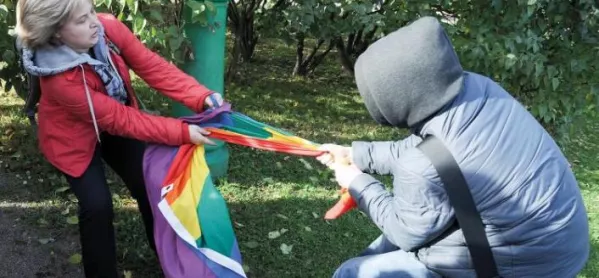Lessons about LGBT+ relationships should be made compulsory in all schools at stages of the curriculum from infants upwards, teachers have said.
An urgent motion was passed at the NEU teaching union’s conference in Liverpool today after months of controversy surrounding the teaching of the inclusive No Outsiders programme at Parkfield Community School in Birmingham.
It noted some parents have opposed the inclusion of LGBT+ rights and cited a parliamentary petition to the government opposing changes to relationships and sex education (RSE) in schools.
Profile: Andrew Moffat, the teacher at centre of LGBT row
Quick read: Ofsted praises Parkfield Community School
Protests: Campaign against LGBT content spreads
But the motion said all children are entitled to high-quality, age-appropriate and rights-based RSE that includes LGBT+ relationships.
Conference also said it was important for schools to have dialogue with parents about the necessity of inclusive education. The motion added: “We should reject any attempts to use this issue to increase Islamophobia.”
It instructed the NEU executive to call on the government to “strengthen the RSE guidance and make teaching about LGBT+ relationships compulsory at all stages of the curriculum”.
The motion asked for additional ring-fenced resources to enable local authorities to develop a common approach and engage with parents and local communities.
Draft guidance on RSE was announced by the DfE earlier this year.
Three new subjects - relationships education from primary school, RSE at secondary school, and health education for all ages - will form part of the school curriculum in England from 2020.
Primary school children will not learn about sexual relationships, but will be learning about having respect for all kinds of people in an age-appropriate way.
Where a maintained primary school chooses to teach aspects of sex education, the school must set this out in its policy and consult parents on what is to be covered.
Under the guidance, secondary schools are expected to include LGBT+ content, while primary schools are enabled to cover LGBT+ content if they consider it age appropriate to do so.
However, the conference voted for teaching about LGBT+ relationships to be made compulsory at all stages of the curriculum.
It also noted that many schools and communities have felt unsupported and left to “make do” in provision of RSE.
Annette Pryce from the NEU executive said: “Everyone has got the right to an opinion, but there is no hierarchy of equality. One protected characteristic does not trump another and that is not what this is about.
“This is about educating young people about the world they live in. Not having them go to school under the impression that the only people they will ever be surrounded by in their whole life are heterosexuals - that is just not the case.”
Mary Bousted, joint-general secretary of the NEU, said: “It is crucial that every young person can feel happy and safe at school but too many LGBT+ young people still don’t feel they can be themselves at school.
“This can hit their self-esteem and motivation at school.
“We can’t address LGBT+ teenagers’ self-harm and exclusion rates without talking openly and positively about LGBT+ people and their contributions to society now, and throughout history.
“Silence about LGBT+ people is the wrong approach, and fuels homophobic bullying, inequality for LGBT+ workers and hate crime.
“Schools need to be confident that they’re right to make sure their relationships and sex education is inclusive of all families and relationships, including LGBT+ people, in an age-appropriate way.
“RSE is just one area of the school curriculum in which the experiences of LGBT+ students need to be appropriately included if we want to break the cycles of discrimination.”




